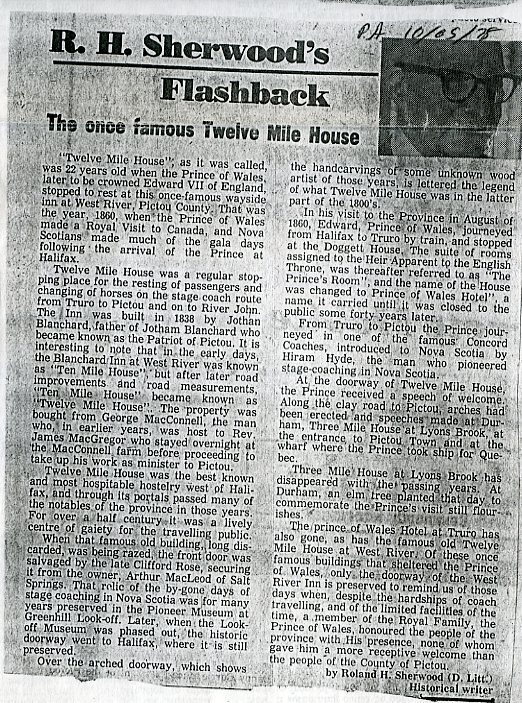
- H. Sherwood’s
Flashback
The once famous Twelve Mile House
“Twelve Mile House”, as it was called, was 22 years old when the Prince of Wales, later to be crowned Edward VII of England, stopped to rest at this once-famous wayside inn at West River, Pictou County. That was the year, 1860, when the Prince of Wales made a Royal Visit to Canada, and Nova Scotians made much of the gala days following the arrival of the Prince at Halifax.
Twelve Mile House was a regular stopping place for the resting of passengers and changing of horses on the stage coach route from Truro to Pictou and on to River John. The Inn was built in 1838 by Jothan Blanchard, father of Jotham Blanchard who became known as the Patriot of Pictou. It is interesting to note that in the early days, the Blanchard Inn at West River was known as “Ten Mile House”, but after later road improvements and road measurements, “Ten Mile House” became known as “Twelve Mile House”. The property was bought from George MacConnell, the man who, in earlier years, was host to Rev. James MacGregor who stayed overnight at the MacConnell farm before proceeding to take up his work as minister to Pictou.
Twelve Mile House was the best known and most hospitable hostelry west of Halifax, and through its portals passed many of the notables of the province in those years. For over a half century it was a lively centre of gaiety for the travelling public.
When that famous old building, long discarded, was being razed, the front door was salvaged by the late Clifford Rose, securing it from the owner, Arthur MacLeod of Salt Springs. That relic of the by-gone days of stage coaching in Nova Scotia was for many years preserved in the Pioneer Museum at Greenhill Look-off. Later, when the Look-off Museum was phased out, the historic doorway went to Halifax, where it is still preserved.
Over the arched doorway, which shows the hand carvings of some unknown wood artist of those years, is lettered the legend of what Twelve Mile House was in the latter part of the 1800’s.
In his visit to the Province in August of 1860, Edward, Prince of Wales, journeyed from Halifax to Truro by train, and stopped at the Doggett House. The suite of rooms assigned to the Heir Apparent to the English Throne, was thereafter referred to as “The Prince’s Room”, and the name of the House was changed to “Prince of Wales Hotel”, a name it carried until it was closed to the public some forty-years later.
From Truro to Pictou the Prince journeyed in one of the famous Concord Coaches, introduced to Nova Scotia by Hiram Hyde, the man who pioneered stage-coaching in Nova Scotia.
At the doorway of Twelve Mile House, the Prince received a speech of welcome. Along the clay road to Pictou, arches had been erected and speeches made at Durham, Three Mile House at Lyons Brook, at the entrance to Pictou Town and at the wharf where the Prince took ship for Quebec.
Three Mile House at Lyons Brook has disappeared with the passing years. At Durham, an elm tree planted that day to commemorate the Prince’s visit still flourishes.
The Prince of Wales Hotel at Truro has also gone, as has the famous old Twelve Mile House at West River. Of these once famous buildings that sheltered the Prince of Wales, only the doorway of the West River Inn is preserved to remind us of those days when, despite the hardships of coach travelling, and of the limited facilities of the time, a member of the Royal Family, the Prince of Wales, honoured the people of the province with His presence, none of whom gave him a more receptive welcome than the people of the County of Pictou.
By Roland H. Sherwood (D. Litt.)
Historical writer
Vault Roland Sherwood File
| File number: | 01-597.10d |
| Contributor: |
|
| Tags: | Pictou, West River, Jotham Blanchard, George MacConnell, James MacGregor, Clifford Rose, Arthur MacLeod, Edward Prince of wales, Roland Sherwood |
| Views: | 1700 |
| Uploaded on: | September 14, 2016 |